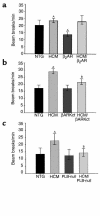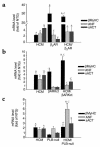Alterations in cardiac adrenergic signaling and calcium cycling differentially affect the progression of cardiomyopathy
- PMID: 11306600
- PMCID: PMC199560
- DOI: 10.1172/JCI12083
Alterations in cardiac adrenergic signaling and calcium cycling differentially affect the progression of cardiomyopathy
Abstract
The medical treatment of chronic heart failure has undergone a dramatic transition in the past decade. Short-term approaches for altering hemodynamics have given way to long-term, reparative strategies, including beta-adrenergic receptor (betaAR) blockade. This was once viewed as counterintuitive, because acute administration causes myocardial depression. Cardiac myocytes from failing hearts show changes in betaAR signaling and excitation-contraction coupling that can impair cardiac contractility, but the role of these abnormalities in the progression of heart failure is controversial. We therefore tested the impact of different manipulations that increase contractility on the progression of cardiac dysfunction in a mouse model of hypertrophic cardiomyopathy. High-level overexpression of the beta(2)AR caused rapidly progressive cardiac failure in this model. In contrast, phospholamban ablation prevented systolic dysfunction and exercise intolerance, but not hypertrophy, in hypertrophic cardiomyopathy mice. Cardiac expression of a peptide inhibitor of the betaAR kinase 1 not only prevented systolic dysfunction and exercise intolerance but also decreased cardiac remodeling and hypertrophic gene expression. These three manipulations of cardiac contractility had distinct effects on disease progression, suggesting that selective modulation of particular aspects of betaAR signaling or excitation-contraction coupling can provide therapeutic benefit.
Figures





Comment in
-
More weapons in the arsenal against ischemic retinopathy.J Clin Invest. 2001 Apr;107(8):945-6. doi: 10.1172/JCI12704. J Clin Invest. 2001. PMID: 11306596 Free PMC article. No abstract available.
-
Beta-adrenergic receptors in the failing heart: the good, the bad, and the unknown.J Clin Invest. 2001 Apr;107(8):947-8. doi: 10.1172/JCI12774. J Clin Invest. 2001. PMID: 11306597 Free PMC article. Review. No abstract available.
References
-
- Packer M, et al. The effect of carvedilol on morbidity and mortality in patients with chronic heart failure. U.S. Carvedilol Heart Failure Study Group. N Engl J Med. 1996;334:1349–1355. - PubMed
-
- The Cardiac Insufficiency Bisoprolol Study II (CIBIS-II): a randomised trial. . Lancet. 1999;353:9–13. - PubMed
-
- Effect of metoprolol CR/XL in chronic heart failure: Metoprolol CR/XL Randomised Intervention Trial in Congestive Heart Failure (MERIT-HF) Lancet. 1999;353:2001–2007. - PubMed
-
- Bristow MR. beta-adrenergic receptor blockade in chronic heart failure. Circulation. 2000;101:558–569. - PubMed
-
- Lefkowitz RJ, Rockman HA, Koch WJ. Catecholamines, cardiac beta-adrenergic receptors, and heart failure. Circulation. 2000;101:1634–1637. - PubMed
Publication types
MeSH terms
Substances
Grants and funding
LinkOut - more resources
Full Text Sources
Molecular Biology Databases
Research Materials
Miscellaneous

